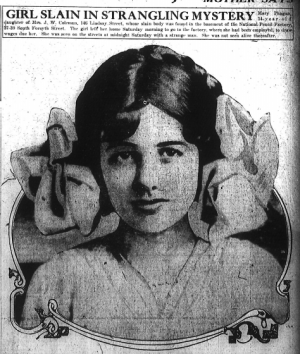Another in our series of new transcriptions of contemporary articles on the Leo Frank case.
Atlanta Journal
August 16th, 1913
MISS IRENE JACKSON DECLARES FRANK LOOKED INTO DRESSING ROOM ON SEVERAL OCCASIONS
Daughter of Policeman A. W. Jackson Testifies That Frank Opened the Door of Dressing Room and Looked in While Young Lady Was Dressing and That a Complaint Was Registered With a Forelady, Miss Cleland, About It
NEWSPAPER MAN TELLS OF JIM CONLEY’S PANTOMIME RE-ENACTMENT AT FACTORY
Solicitor Dorsey Attacks the Pinkertons, Charging That They Failed to Report Their “Finds” to Police—Many Young Women Employed at the Factory Testify to Frank’s Good Character—Court Adjourns Until Monday Morning
With Harllee Branch, a reporter for The Journal, on the witness stand where he had just described Conley’s pantomime re-enactment of his alleged part in the disposal of the body of Mary Phagan, witnessed by him as a newspaper man, the trial of Leo M. Frank was adjourned at 1:05 o’clock Saturday afternoon until Monday morning at 9 o’clock. Mr. Branch, summoned by the defense to testify in regard to an interview with Jim Conley at the tower, over the protest of Attorney Luther Z. Rosser, was permitted by the court to describe Conley’s pantomime re-enactment when requested to do so by the solicitor.
Just before court adjourned, Judge Roan addressed a few words to the jury, expressing regret that it was necessary to keep them away from their families another Sunday but stating that he sincerely hopes this would be the last Sunday that they would have to held together.
Unexpected testimony for the state was drawn from Miss Irene Jackson, daughter of Policeman A. W. Jackson, a former employe of the factory, who had been summoned as a defense witness. On cross-examination Solicitor Dorsey developed testimony to the effect that the girls in the factory were somewhat afraid of Frank, that on one occasion Frank had looked into the dressing room while Miss Emily Mayfield was partly dressed and that Miss Mayfield had complained to a forelady, Miss Cleland. She told of other occasions on which the superintendent is alleged to have pushed the door of the dressing room open while the girls were in there dressing. She admitted on cross-examination that the occurrence to which she testified occurred last summer, but that she had […]
when her father made her leave. She also admitted that there had been complaint of the girls flirting through the windows of the dressing room and that Frank had spoken to her forelady about it.
Continue Reading →


